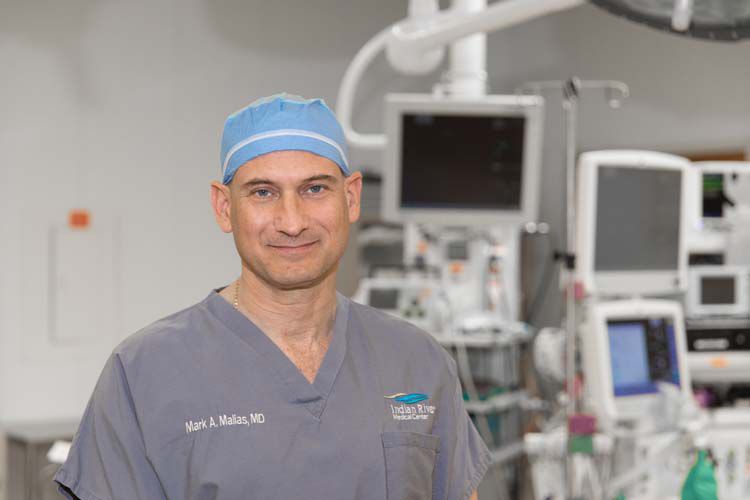
The Welsh Heart Center at the Indian River Medical Center just broke new medical ground.
For the first time ever, Trans-catheter Aortic Valve Replacement (TAVR) procedures are now being performed in Indian River County.
The John Muir Health Foundation of San Francisco reports that more than 5 million Americans are diagnosed with heart valve disease each year. Aortic stenosis is far and away the most common of these diseases.
Aortic stenosis is commonly caused by calcium buildup or scarring that narrows one or more of the valves inside the heart. Largely a result of the aging process, it can and does cause heart failure, cardiac arrest and – yes – death.
Eighty percent of those with aortic stenosis are men, and without intervention the survival rates for this disease are low.
So an IRMC heart team has come together to launch a new heart valve replacement program, radically altering the landscape of heart care in Vero Beach. The team includes cardiovascular surgeons Dr. Cary Stowe and Dr. Mark Malias; interventional radiologist Dr. Clarence Yates; interventional cardiologists Dr. Jay Midwall and Dr. Joshua Kieval; Dr. John Lindenthal, a cardiac anesthesiologist; and critical care specialist Dr. George Mitchell, together with members of the catheterization laboratory team and the hospital’s operating room staff.
Heart valve replacements used to require an open-heart surgery called a “sternotomy” in which the chest is, quite literally, cut and splayed open to gain access the heart.
The TAVR procedure, however, is minimally invasive. It is done by running a catheter – usually through the femoral artery in the groin – up to and inside the heart muscle itself. No incisions are made in the chest at all.
A fully collapsible tissue replacement valve is then delivered to the site of the existing damaged or diseased valve or valves through the catheter. Once in place, the new valve is expanded with a small balloon, pushing the old valve leaflets out of the way and taking over the job of regulating blood flow in and out of the heart muscle far more efficiently.
Cardiovascular surgeon Malias is almost effervescent as he says “I am really excited about this. I’m excited for our patients.
“I get very frustrated when I operate on an 85-year-old guy and do a [traditional surgical] triple-valve replacement and he spends the next 30 days here in the hospital afterwards,” Malias says. “You start to question, was that a success or not? But with this, I would anticipate the hospitalization being two-to-four days as opposed to 30 days.”
Less physical trauma also means a change in post-op medication.
“For a surgical aortic valve replacement,” Malias explains, “I would put patients on Coumadin for three months, but with [the new-to-Vero TAVR procedure] lots of surgeons just put patients on Plavix and Aspirin.
Moreover, according to Malias, TAVR can radically reduce a patient’s fear factor. “Some folks,” he explains, “come into a surgical sternotomy scared,” but for patients who’ve had the TAVR procedure fully explained, there’s far less trepidation.
There’s also a time factor favoring TAVR. A sternotomy can last five or more hours, adding to patient stress, but Malias says the catheter-based procedures typically take only about 60 minutes.
Malias talks about the TAVR team as a melding of skills – “the cardiologist skills, surgical skills, the radiologist’s skill interpreting new, high-powered CT scans, and the cardiac anesthesiologist who’s interpreting a 3-D echo as we’re blowing up the balloon – all these skill sets are coming together to take care of one patient.”
“Before, we used to pass the patient along from one doc to the other. Now it’s one patient and all the docs are coalescing their knowledge around that patient.”
IRMC shares Malias’ enthusiasm for the new procedure and will be adding another cardiovascular surgeon, Dr. John Brock, to its team later this month.
Malias says the demand for the procedure is already strong.
“We’ve already had patients come say, ‘I just want TAVR; I don’t want surgical aortic valve replacement,’” Malias says. “What we’re witnessing is medical consumerism.”
Still, the FDA isn’t always in sync – let alone in lock-step – with medical consumerism.
Currently the TAVR procedure is only approved by the FDA for patients deemed at “extreme, high or intermediate” risk of death from the complications associated with open-heart surgery.
So, typically a patient’s personal cardiologist must make a referral to Dr. Stowe and to Dr. Malias – for a second opinion – as well as to an interventional cardiologist to determine that patient’s eligibility for the TAVR procedure.
However, since the American Heart Association flatly states that “heart valve disease seriously increases a person’s risk for sudden death,” it is entirely possible – and maybe even probable – that the FDA will soon authorize TAVR for all heart valve patients, and now that procedure is available right here in Vero Beach.
The Welsh Heart Center is located inside IRMC just off 36th Street in Vero Beach.



